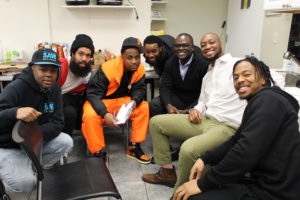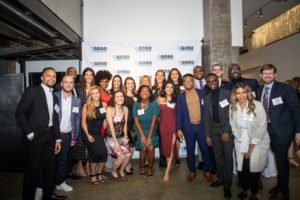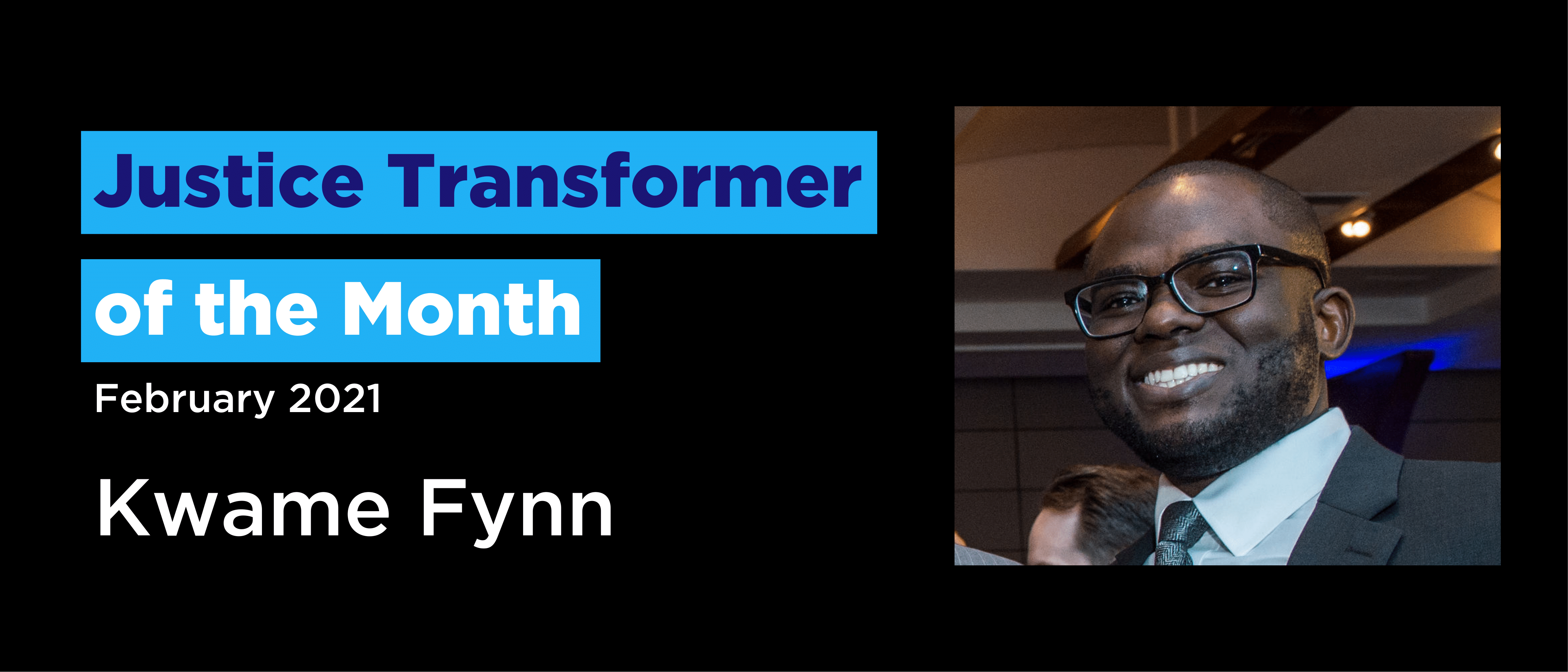Our monthly GOSO Justice Transformer series continues, which will recognize individuals from our community who are working to create a more equitable and vibrant world. Kwame Fynn is a long-time volunteer at GOSO and is a founding member of our Action Board. Born in Ghana, Kwame is a portfolio manager at Goldman Sachs in New York. In addition, he is involved in diversity, mentoring, and recruiting initiatives at the firm. His insightful views on equity in hiring and dedication to our participants’ success are why he is this month’s Justice Transformer! Read our interview with him below:
What made you want to get involved with GOSO as a volunteer and later, an Action Board member?
The first time I heard of GOSO was in 2015, when Reginald Andre – GOSO’s Board Chair, invited me to the gala. During the reception, I met GOSO’s founder, Mark Goldsmith (MG), and my curiosity led me to ask him many questions to understand what GOSO was about. We had a very engaging dialogue and MG told me to just “show up”; that would be the best way to really know more about GOSO and their impact.
A few months after the gala, I spent a day volunteering at the GOSO office and the rest is history. Over the years, I’m continuously impressed with the participants I meet and the work GOSO does. It’s a program where people participate on a voluntary basis. GOSO is a vibrant community where lives are changed and I’m fortunate to serve as a leader here.
Can you talk about what you do in your career at Goldman Sachs?
I work in a group called Multi-Asset Solutions, where we invest on behalf of institutional clients such as pension plans, sovereign wealth funds, endowments and foundations. We also create funds and make them available to the general public through the platforms of other financial providers.
When it comes to finance, what are some of the inequities in finance that you see? What are barriers holding people back from attaining financial stability?
Let’s start with education – financial literacy to be precise. I’m not aware of any broad-based curriculum in the U.S. educational system that includes basic principles of finance. Without this foundation or a keen interest, it is challenging for most people to avoid preventable pitfalls.
Stigmatization is another source. From volunteering at GOSO, I’ve seen that people who have been previously involved with the criminal justice system can end up in a vicious cycle of financial challenges due to social biases against them. When someone is incarcerated it is almost impossible for them to find a job, get adequate finances, and get back on their feet.

Kwame (third from right) with GOSO participants, fellow Action Board members, and GOSO staff at Black History Month Trivia Night in 2020.
How can corporations become more inclusive, diverse, and socially responsible?
I think there are a few ways: one is creating access. Access within institutions that, historically, have had biases (either known or unknown) or haven’t been as open to explore such topics. Additionally, participation has to be across the organization, particularly among leaders.
The other part that I think is helpful is when corporations create partnerships with institutions and nonprofits like GOSO. Over time, volunteering educates us. It challenges our biases and, hopefully, erases some of our prejudices. This then becomes the norm.
At the end of the day, it’s important to create relationships between the for-profit and nonprofit worlds. For example, creating opportunities for collaboration or pro bono work is one way to develop a symbiotic relationship. We need to have a mutual understanding to work together.
Can you describe some of the diversity and mentoring initiatives you’re involved with at Goldman Sachs?
At Goldman, I am part of my division’s Black Employee Network Steering Committee and like my involvement with GOSO, I have been involved for a few years now. We support the diversity efforts for the Black employee populations at all career levels.
Additionally, I have been involved with recruiting. Before the pandemic, I hosted students from my alma mater, Macalester College, through a yearly program for those interested in the investment industry. It was important to provide access and transparency for students to understand who we are and what we do. During their visit at Goldman, we would explain the different career paths and businesses and encourage students to consider careers in the industry.
How is your work with these diversity initiatives helping to transform traditionally white and male-led spaces? What do you make of the perceptions and bias in hiring?
Visibility matters. Throughout my career at Goldman and taking on leadership roles within and outside the firm, I have met leaders from various backgrounds and I’ve been inspired by their advice and mentorship. I’m a firm believer in the concept of an enriched outcome through the diversity of thoughts and perspectives.
To create awareness, I’ve encouraged my friends and colleagues to volunteer at GOSO and help spread the word. That volunteering experience provides an opportunity for others to be aware of some challenges marginalized communities face.
Progress entails multiple groups of society learning from each other. Coming from Ghana for my undergraduate studies in the U.S., I learned about some of the racial and cultural nuances of Blackness in America. At the same time, since racial biases aren’t as prominent in Ghana, I could have ignored some of the structural issues embedded in the U.S. This is to say, irrespective of our backgrounds, the only way for things to get better is for us to be open to learning and challenging our beliefs.
If society at large fails to be inclusive and continues to build structures that marginalize people, we will reach a breaking point. The sooner we fix this, the better.
How can we level the playing field, so that people from diverse backgrounds and people with justice involvement can see a future for themselves in an industry like finance?
First, I think institutions can create better access and educate people to garner interest. Sometimes, people with justice involvement may be in situations where access to basic resources is beyond their reach. GOSO has a phenomenal platform to help alleviate this through its employment and education pillars.
The second thing is creating awareness, particularly around the stigmatization of incarceration. We’ve all made mistakes and if everybody were to be criminalized for them the whole world would be in jail!
Finally, strong leadership and engagement from the broad population matters. Everyone is empowered to make change and should work towards the lasting positive effects of having a more inclusive society.
Is mentoring young people who share experiences with you important?
Not necessarily. Having similarities helps create a rapport. However, I think there’s sometimes power in differences because we get to learn from each other. I have learned a lot from the GOSO participants mostly based on our different experiences and viewpoints.
I don’t believe a shared background is necessary to volunteer at an organization. A belief in the cause and a genuine desire to engage matters the most, in my opinion. To me, the most important things in a mentoring relationship are mutual respect and being open to learn from each other.

Kwame (top row, second from right) with the entire GOSO Action Board at their GOSOcial fundraising event in 2019.
How important are diverse perspectives and working relationships to you on a team?
The world is a blend of science and art. If you have the ability to have diverse perspectives, you have a much better outcome. This spans across my personal and professional life. In scenarios where I have those diverse perspectives, it enriches the outcome, and I hope it enriches the experience for the people around me.
What does justice transformation mean to you?
That’s an interesting question that I’ve been thinking about lately. In an ideal world justice transformation is where a society does not need institutions like GOSO. In the real world, justice transformation means a fair playing field without inherent social or racial biases. It should serve as a means of correction to improve livelihoods.
February is Black History Month, how do you celebrate Black achievement and progress after such a tumultuous year for Black people in America?
The challenges that the Black community faced last year were awful. Unfortunately this isn’t the first time it has happened in the U.S. People shouldn’t have had to die to create awareness of racism, but, I am cautiously hopeful that we can change for the better in real and lasting ways.
I’m excited to continue celebrating the success of Black people. I wouldn’t want others to sensationalize this year as a fleeting moment. I’m hopeful that over time, we as a society pair actions with our dialogue to create platforms for Black people to succeed, and to celebrate Black achievement beyond February.
Do you have a personal motto that guides you in your daily life? What keeps you focused and motivated during challenging times?
To navigate challenges, I try to take time to take care of myself. Last year was challenging for everyone. I care about GOSO and my company, I care about my family, and I care about my friends. Taking care of myself gives me a greater capacity to be there for others.
My personal motto is driven by my math background. I believe today should be better than yesterday and tomorrow should be better than today (Tomorrow > Today > Yesterday).
You have coached participants at GOSO, what advice would you give job seekers in a difficult moment where it can be difficult to make the right impression virtually?
Virtual interviewing is a challenge, but do your best and be yourself. Take it as seriously as an in-person interview. In my view, if you put your best foot forward and are your authentic self, things will work out.

